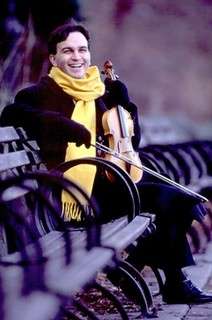|
Back
The Dubious Sounds of Nature New York
Avery Fisher Hall, Lincoln Center
02/25/2010 - & Feb.26, 27, 2010
Maurice Ravel: Suite from Mother Goose
Samuel Barber: Concerto for Violin and Orchestra, Opus 14
Béla Bartók: The Wooden Prince, opus 13
Gil Shaham (Violin)
New York Philharmonic Orchestra, David Robertson (Conductor)

G. Shahan (© Boyd Hagen)
Gustav Mahler said, “My music is the sound of nature.” Had Mahler been referring to New York’s “nature” tonight, his music would have been slushy and mushy, the darkness barely shadowing people sliding and slipping, the rain turning to snow, the snow turning to rain, the sidewalks turning to hazardous cold waste material.
Conductor David Robertson had no silly Mahlerian ideas. He kept his musical nature firmly inside Avery Fisher Concert Hall. Instead of slush and rain, he led the Philharmonic through enchanted gardens. Rather than ice glazing hard concrete, Mr. Robertson generated dancing trees, rambling waves. Instead of rusty ramps precipitously leading to the concert hall, he stayed on stage and gave us an exotic pagoda, a beautiful palace and an endless forest.
Yes, the New York Philharmonic was in a nature mood tonight (as they will be tomorrow and Saturday). Two of the three pieces were about fairy tales, and even the third work, Samuel Barber’s Violin Concerto had two charming movements which edged onto perfect beauty.
Perfection is apt to be dull, and Samuel Barber’s perfect moments can become pallid under the wrong hands. (Adagio for strings used to be perfect until Madison Avenue kidnapped it.) But Gil Shaham is a mean kid with his 1600 “Countess Polignac” Stradivarius, and he played the Barber with an unrepentant beauty. Like Joshua Bell, Mr. Shaham makes everything seem easy if not profound. The Barber was not dashed off, but the first movement was played with surface simplicity, as it should be. The Andante begins with one of those Barber themes which attach itself to the brain for hours afterwards, but this oboe theme–played so elegantly by Liang Wang–is truly beautiful, that beauty carried on by Mr. Shaham.
The final Presto was caviar for the violinist, and he carried off the moto perpetuo like it was a simple C major scale. But that is his way–and when he came out for the encores and ceremoniously bowed to conductor David Robertson and the Phil, you knew that he had a personal relationship with both.
Mr. Robertson can weave pictures with the New York Philharmonic like few other conductors, and he had two chances here. True, with the Ravel Mother Goose Suite, he played the opening Lent like Molto adagio, a very slow, but probably correct Pavane. “Tom Thumb” was also slow, but Mr. Robertson was probably setting a story-telling pattern, for when we came to the exotic pagodas and the final “Enchanted Garden”, he had hypnotized us with the tales as much as the music.
Béla Bartók’s own enchanted garden was a more frightening one, the “dancing play” (the story of which was flashed on the screen) made of a baleful fairy, a Prince who is kept from entering a forest, and many a sacrifice from both Prince and Princess.
A Freudian would say that The Wooden Prince was the tale of a nympho woman who cares nothing about men except their big wooden staff. But scenarist Béla Balázs thought it was a metaphor for the artist and his art. In any case, the music of the complete “dancing play” has some wonderful moments.
Mr. Robertson made the most of them. The opening could have been the opening of Rheingold in its placidity. And while Bartók was no longer collecting or using folk tunes, the dances here were decidedly Magyar. Mr. Robertson had the best time of all with the dance of the aforesaid wooden staff (which miraculously moves on its own. Bartók knew his drama, and the stick begins with some grotesque notes, but then works into a bounding somewhat crazy bumptious bumping dance.
Mr. Robertson obviously loves these moments, and the orchestra moved with angular rhythms edging on the anarchic.
All of this takes place in a lovely forest. Music finished, we had our own miracle. What had been slush and ice going into the concert hall had become white, pure, glistening mid-Manhattan moon-lit snow. We still slipped and slid, but nature had finally by transformed by the music within.
Harry Rolnick
|